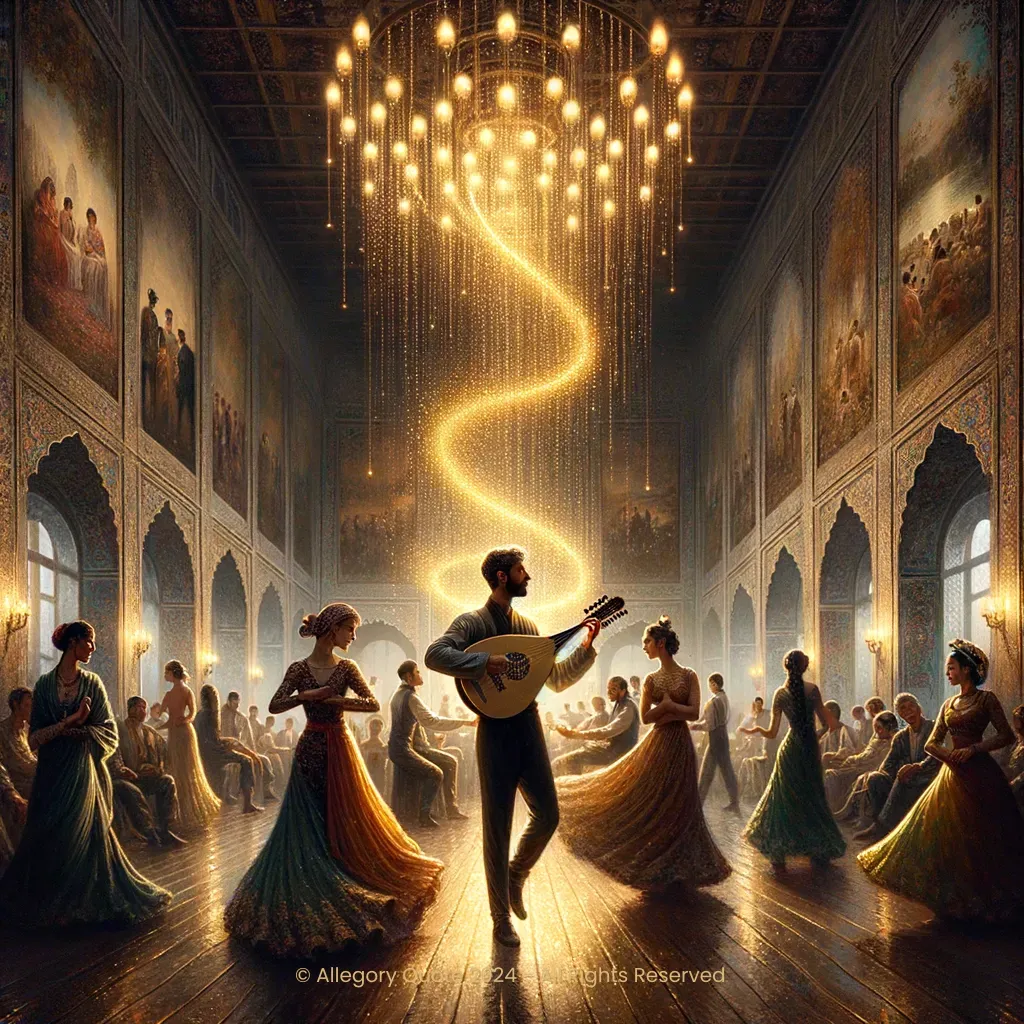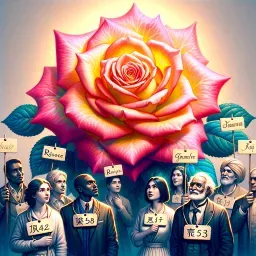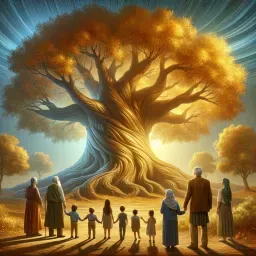If music be the food of love, play on

0
0
0
0
- Meaning
- At its core, the phrase "If music be the food of love, play on" suggests that music sustains and nurtures love as food does for the body. Duke Orsino, the character who speaks these words, is in a state of deep longing and believes that by indulging in music, he can either satiate his infatuation or extinguish it through an overwhelming excess. This highlights the powerful emotional connection between music and love, suggesting that music can amplify and nourish romantic feelings.
- Allegory
- This allegorical image uses elements like the grand hall and gentle chandelier light to symbolize the elegance and richness of love and art. The central musician playing the lute, with notes appearing as golden threads, visually conveys how music weaves through the air, binding everyone with emotional resonance. The couples dancing with expressions of true affection highlight the nourishing power of music for love. The luxurious tapestries and romantic paintings on the walls further emphasize the deep connection between art, culture, and emotional experiences, resonating with Shakespeare’s theme of music feeding love.
- Applicability
- This phrase can be applied to personal life by acknowledging the role that art and beauty play in enhancing and expressing emotions. Whether it's through listening to music, engaging in creative activities, or appreciating art, these endeavors can deepen our emotional connections and provide therapeutic outlets for our feelings. It suggests finding solace and connection in our passions, especially when dealing with complex emotions like love.
- Impact
- This phrase has had a significant cultural impact, becoming one of Shakespeare's most cited lines. It underscores the timeless connection between music and emotion, influencing countless artists, musicians, and writers. The quote has appeared in numerous adaptations, films, and literature, demonstrating the enduring resonance of Shakespeare’s work. It is often used to express the idea that music and creativity can feed and sustain emotional experiences.
- Historical Context
- The historical context of the phrase dates back to the Elizabethan era, around 1601-1602 when Shakespeare wrote "Twelfth Night." During this period, literature and theater were flourishing under the reign of Queen Elizabeth I. Music was an integral part of social life and played a significant role in courtship and entertainment. The phrase reflects the era's cultural emphasis on art as a vital component of human expression and emotional life.
- Criticisms
- There have been minimal criticisms or controversies specifically related to this phrase. Some may argue that the hyperbolic indulgence in music and love depicted in the quote might not be practical in real-life situations. However, these criticisms are more about the interpretation of romantic idealism rather than the phrase itself.
- Variations
- Variations of this phrase mostly revolve around reinterpretations in different cultural contexts. For example, in some cultures, the idea that "music nourishes the soul" is a common sentiment, showcasing the universal appreciation of music as a form of emotional sustenance.
-

The golden age is before us, not behind us.
-

A horse! a horse! my kingdom for a horse!
-

Parting is such sweet sorrow.
-

To weep is to make less the depth of grief.
-

What's in a name? That which we call a rose by any other name would smell as sweet.
-

All the world's a stage, and all the men and women merely players.
-

A little more than kin, and less than kind.
-

Some rise by sin, and some by virtue fall.
-

The lady doth protest too much, methinks.
-

What is past is prologue.
-

Now is the winter of our discontent.
-

No legacy is so rich as honesty.
No Comments